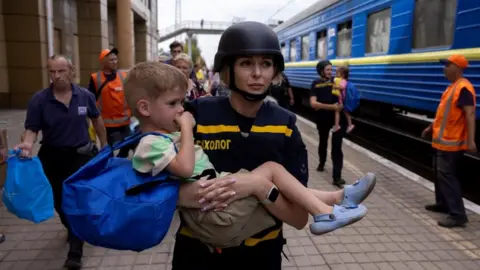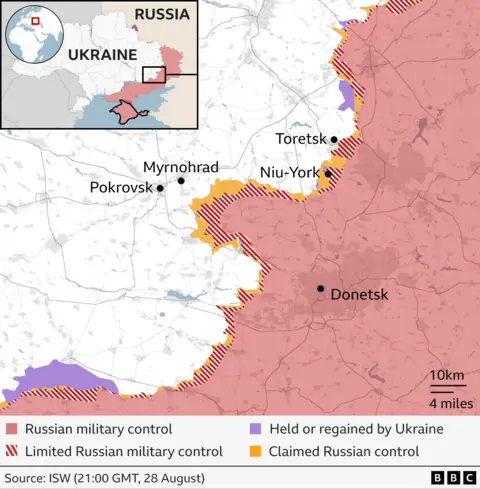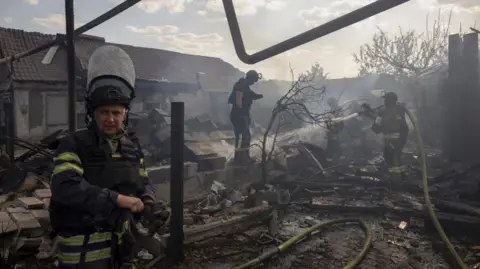 REUTERS/Thomas Peter
REUTERS/Thomas PeterThe town of Pokrovsk plays a crucial role as a logistics hub used by Ukrainian forces in the eastern region of Donbas. It is home to a key railway station, and it is located at the intersection of several important roads.
Russian forces have for months sought to capture the town, but their advance has quickened in recent weeks and they have seized the village of Novohrodivka about 10km (6 miles) to the south east.
Before the war, Pokrovrsk was home to some 69,000 residents, with many of them employed in coal mining, metallurgy and machine-building. It sits adjacent to another mining town, Myrnohrad, which is even closer to the front line and is coming under fierce bombardment.
Thousands have fled the Russian advance on Pokrovsk in recent months, but families with children have been ordered to evacuate too. Civilians were running out of time to leave, Serhiy Dobriak warned.
Ukraine had hoped that by seizing territory in Russia’s Kursk region it would be able to divert Russian troops away from their eastern advance, but that has not happened. If anything the Russian offensive on Pokrovsk, and Toretsk further to the north east, has intensified.
“Pokrovsk is a very important hub, a centre of defence. If we lose Pokrovsk, the entire front line will crumble,” military expert Mykhaylo Zhyrokhov warned.
Ukraine relies on the town’s rail and road infrastructure to provide supplies and reinforcements to its troops on the eastern front line, as well as to evacuate the wounded.

Losing Pokrovsk to Russian forces would mean these vital military tasks would become far more complicated.
It would also increase the risk to other strategically important towns, such as Chasiv Yar, which sits atop commanding heights giving control over the wider area.
“If they cut our logistics, then Chasiv Yar will be doomed,” says analyst Pavlo Narozhny. “It will be a matter of time before we’ll have to pull out of it because we won’t be able to supply our fighters there.”
Pokrovsk has always played the role of an important railway centre serving the needs of Ukraine’s heavily industrialised east.
In fact, it grew around a station built in the late 19th Century.
It became known as the coal-mining capital of Ukraine after the capture in 2014 of Donetsk, the main city of Donbas, which stands for “the Donetsk coal basin”.
Pokrovsk is home to Ukraine’s largest producer of coking coal. It is vital for metallurgy, which, in turn, plays a key role in the country’s economy.
Metals were Ukraine’s main export product before Russia’s full-scale invasion two and a half years ago, accounting for 23% of total goods exports.
Their export value has now shrunk to a quarter of that level as the country’s industry has been ravaged by the war.
 REUTERS/Thomas Peter
REUTERS/Thomas PeterA Ukrainian soldier stationed in Pokrovsk told the BBC’s Ukrainecast podcast that the large number of industrial buildings in Pokrovsk and neighbouring towns such as Myrnohrad were very helpful to Ukrainian defences.
“They will have a huge challenge to get this area because it’s a very industrialised area with pretty significant defence lines,” said the soldier, identified as Ostap.
Asked about the potential consequences of the fall of Pokrovsk, he said: “Total destruction of these cities and a lot of people dead, and a lot of suffering.”
“After that there will be more cities, so I really hope that we will stop them on the outskirts of Myrnohrad and Pokrovsk.”
The capture of Pokrovsk would have symbolic significance, too.
The Kremlin’s media machine would use it to counterbalance the embarrassment of Ukraine’s capture of territory in Russia’s Kusk border region.
It would also be a significant step towards the full occupation of Ukraine’s Donetsk region, which Russia declared as part of its territory back in September 2022.


